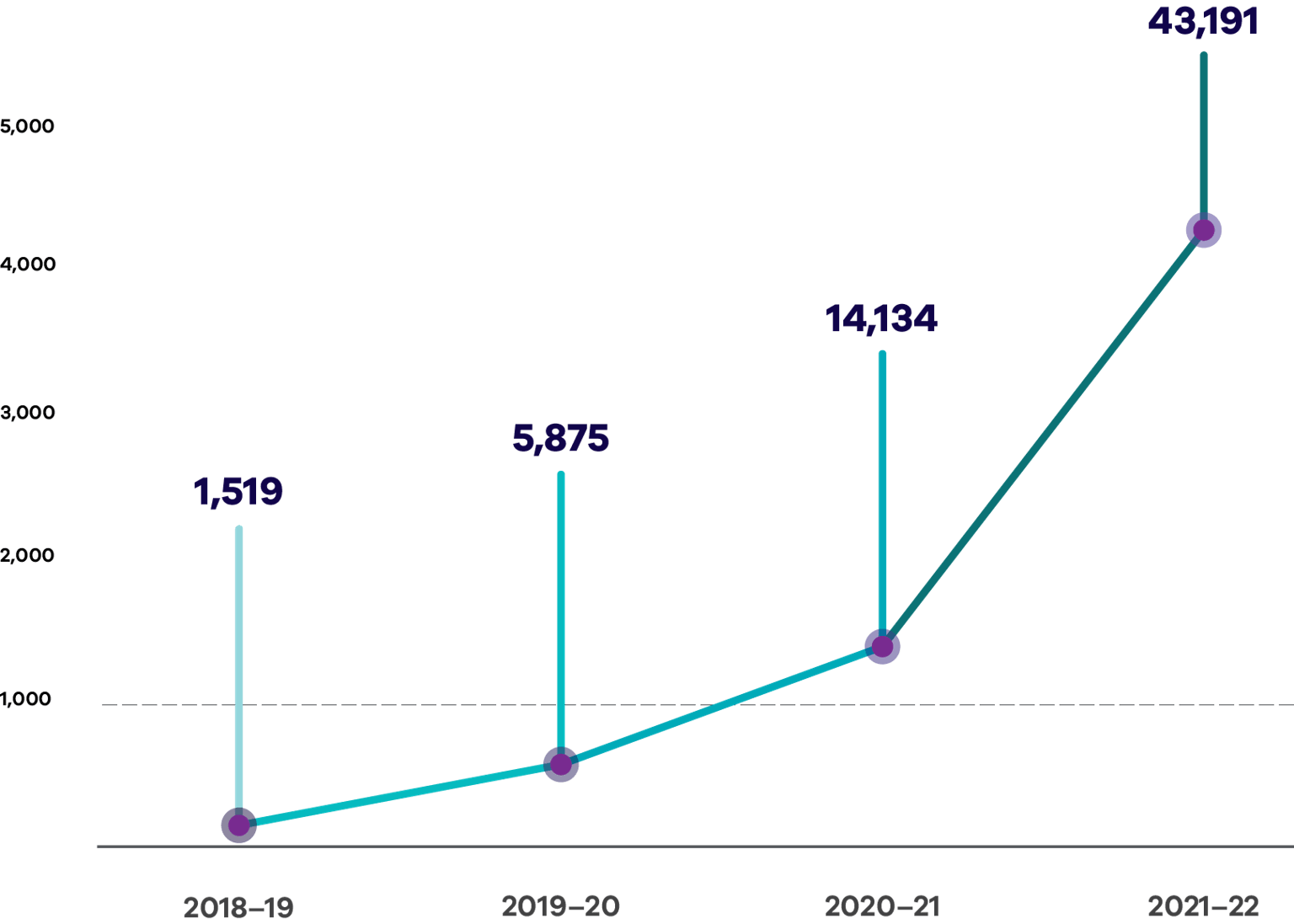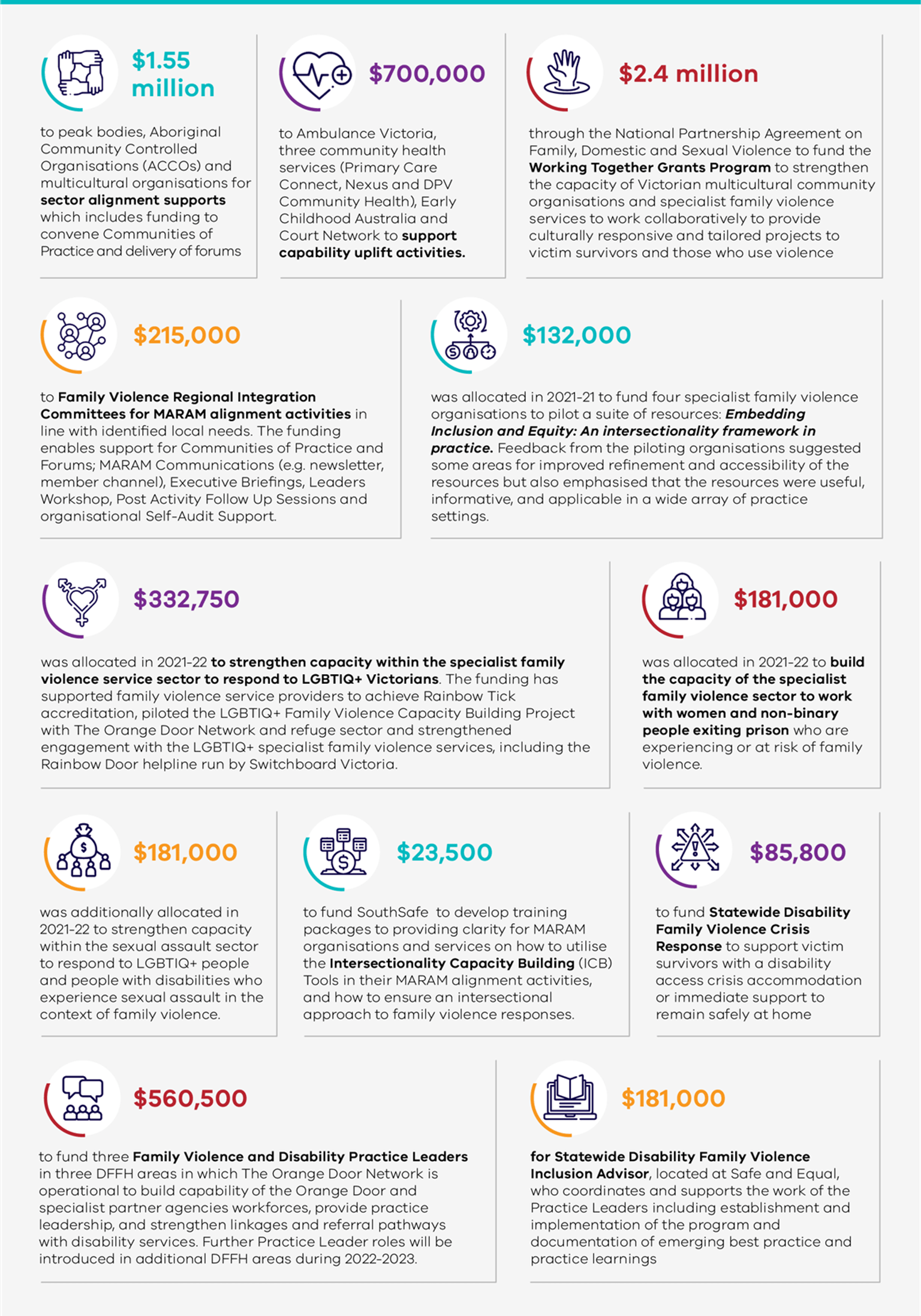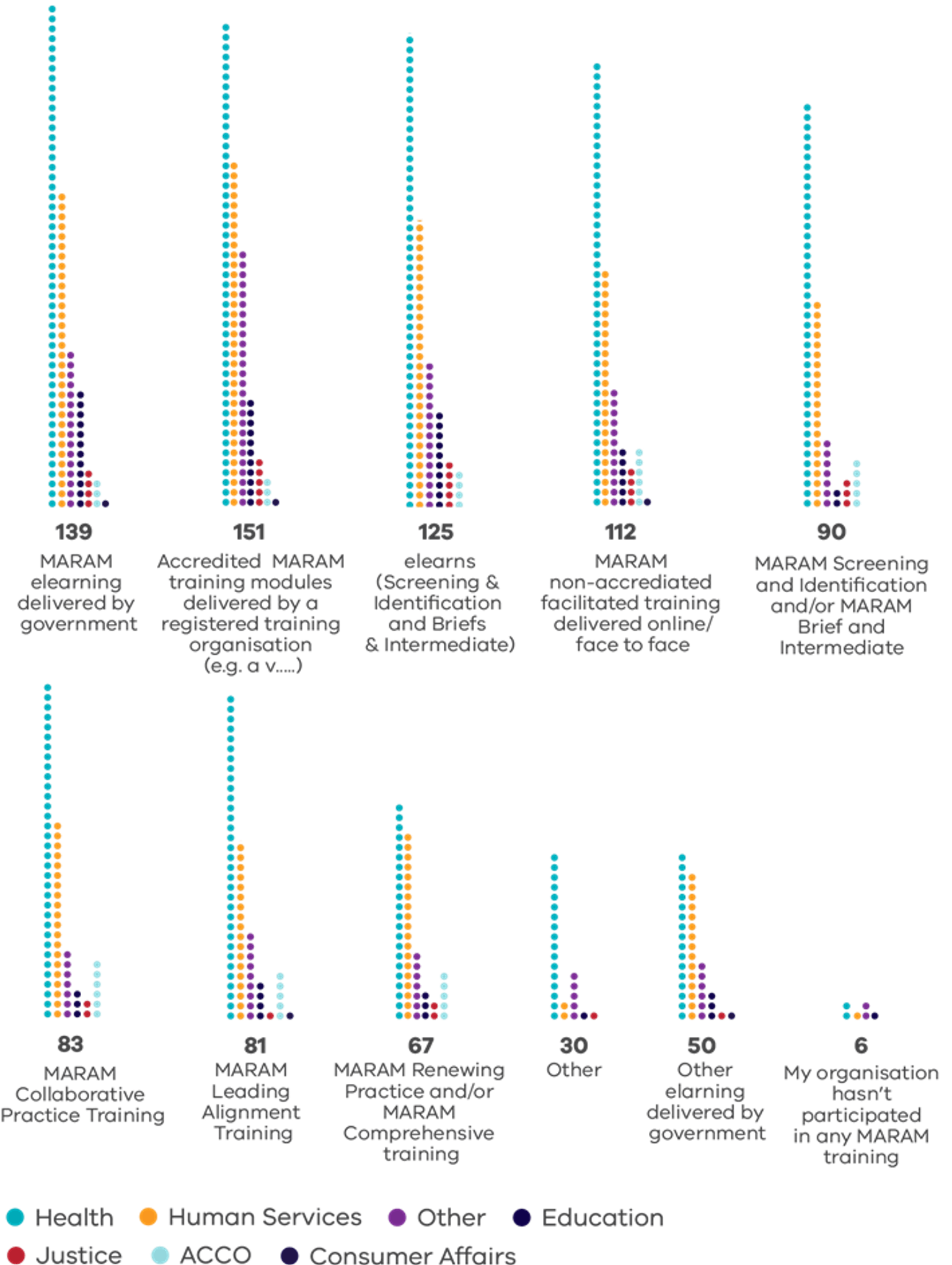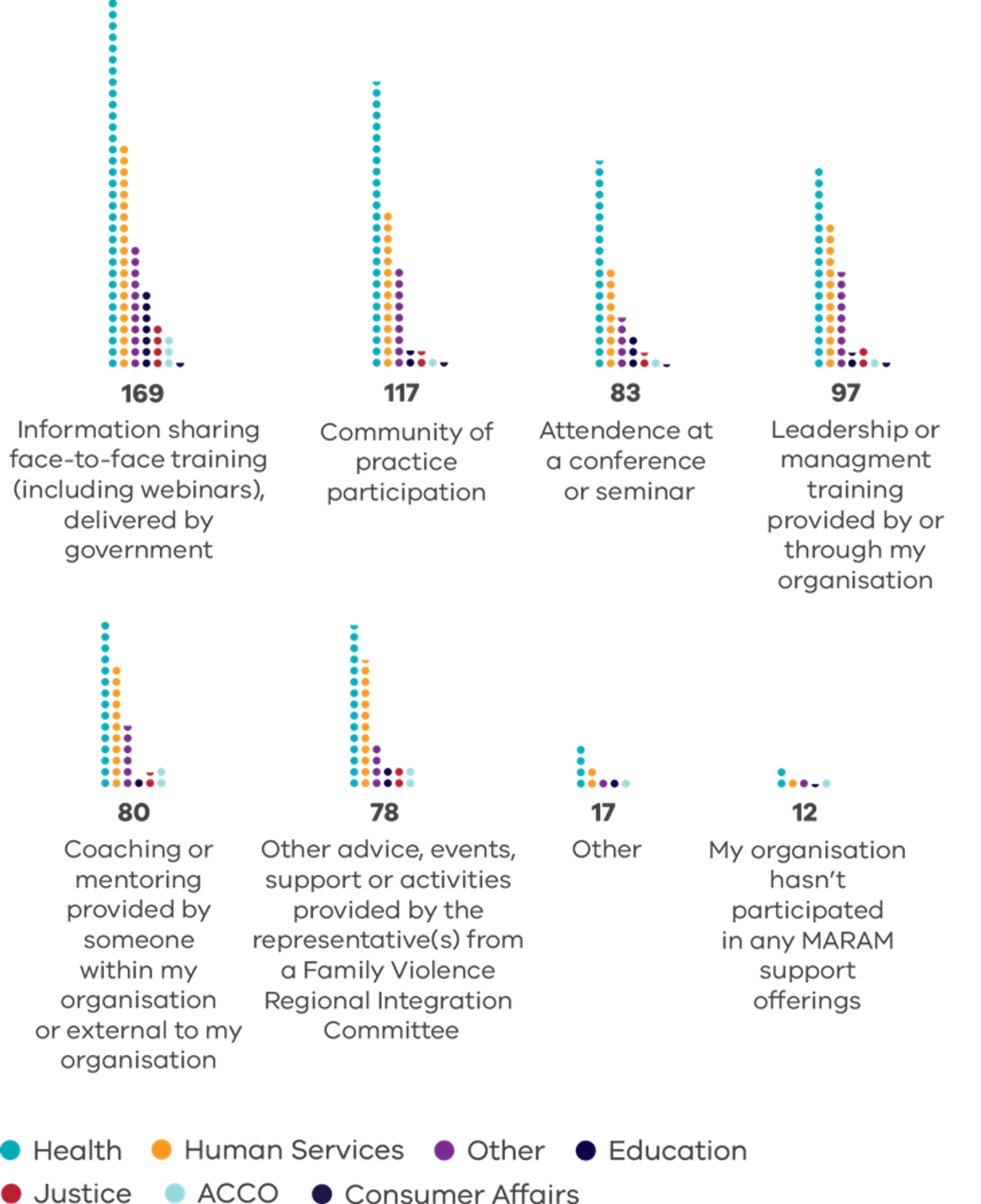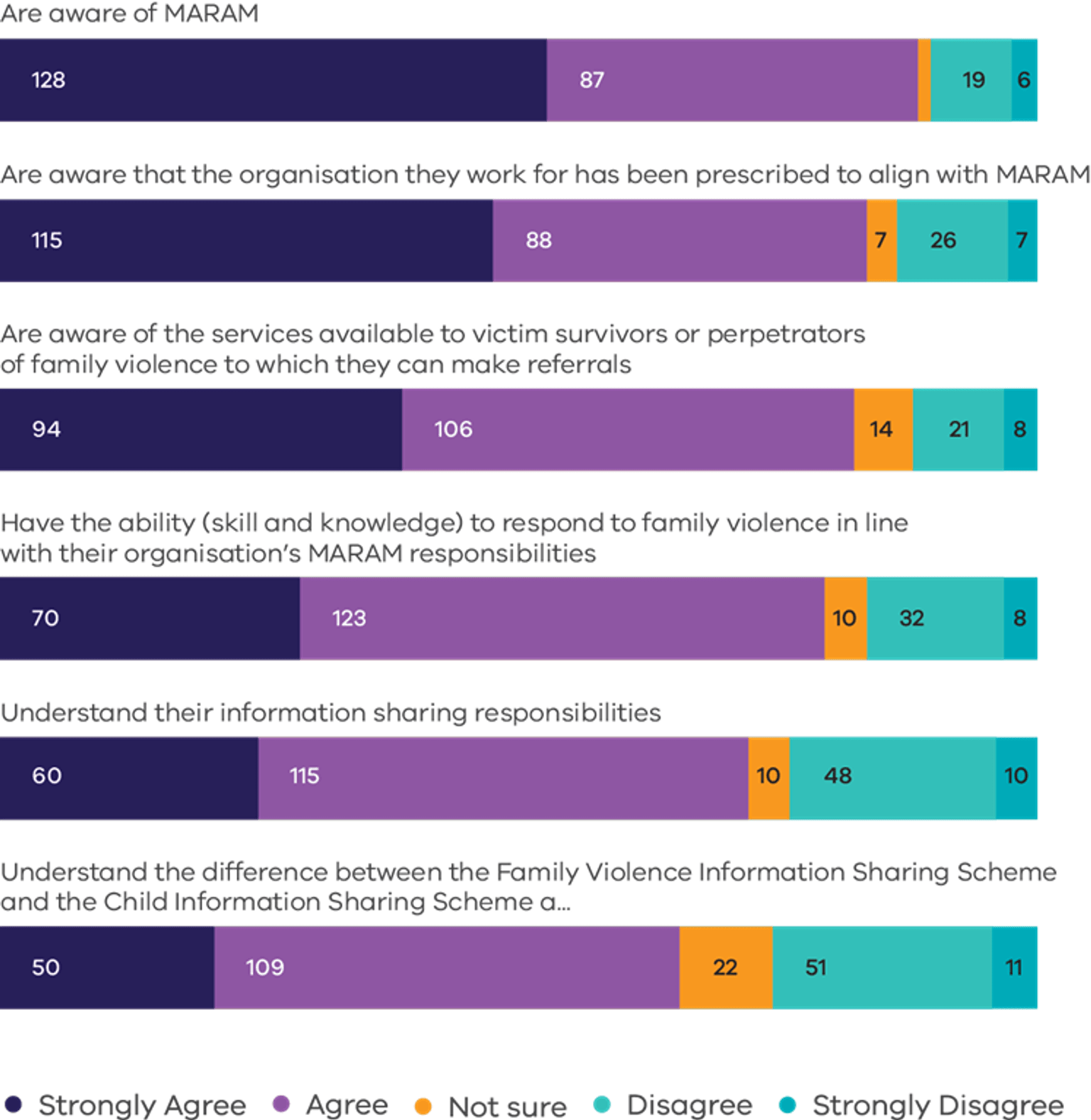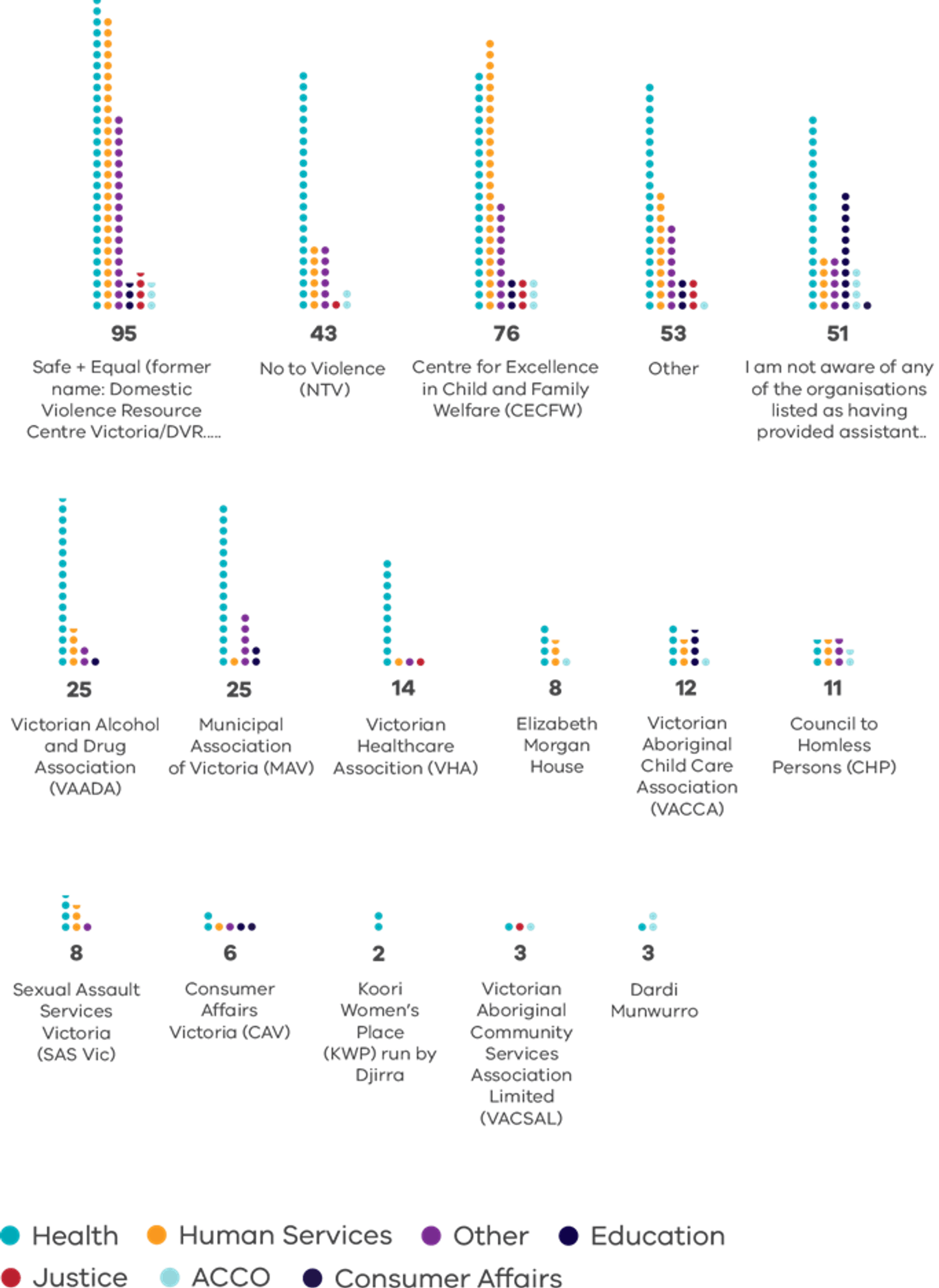Successful implementation of the reforms requires practitioners to be appropriately trained in MARAM and information-sharing responsibilities. Training and other capability-building activities have been a priority from the outset of the reforms.
Core MARAM training in victim survivor practice for identification, intermediate and comprehensive practice has been available since 2020. This is delivered by Safe and Equal, on behalf of Family Safety Victoria, with departments also making their own arrangements for delivery of workforce tailored versions. Collaborative practice MARAM training is available regionally and delivered through the Family Violence Regional Integration Committees.
This report identifies the expansive training and capability-building activities available in multiple formats, along with available data and feedback on training.
Facilitated learning is the preferred method of delivery, but it is resource intensive. With the number of participants to be trained and available trainers, it would take a significant number of years to complete. Facilitated learning also achieves higher learner satisfaction rates, compared to self-paced eLearns. However, eLearns are readily accessible for participants.
Across the WoVG, departments are using facilitated and eLearn training, which have been tailored to workforces. This ensures:
- a greater number of participants can be reached
- eLearns are a sustainable resource that can be embedded into induction programs
- increased accessibility.
Section A: Family Safety Victoria as WoVG lead
Non-accredited training (outside of the technical and further education (TAFE) and university sector) allows for upskilling workforces within a short timeframe to meet demand. There has been an increase of 205 per cent on 2020–21 figures, with 43,191 professionals having now received MARAM training.
Accredited training is designed to reach pre-service and in-service workers and communities across the state. In June 2022, work was completed on new training and assessment resources for the Identifying and Responding to Family Violence Risk course, which has been available for delivery since 2019.[17]
Work has also commenced to refresh the Course in Intermediate Risk Assessment and Management of Family Violence Risk[18]. The new Centre for Workforce Excellence in the Department of Families, Fairness and Housing will continue to work with family violence peak bodies and industry experts on the course refresh to achieve successful re-accreditation.
The range of Family Safety Victoria capability-building activities and funding is not limited to MARAM and FVISS exclusively. Other funded capability-building activities are also funded, and are MARAM aligned. These activities are included in Figure 18.
[17] 22510VIC: Identifying and Responding to Family Violence Risk course.
[18] 22561VIC: Intermediate Risk Assessment and Management of Family Violence Risk course.
Section B: Departments as portfolio leads
Department of Education
Building on the training that commenced in 2020–21, the Department of Education continues to deliver information-sharing and family violence reform leaders’ briefings and practical workshops for professionals.
The leaders’ briefing online sessions include a 1.5-hour briefing for leaders to prepare for and implement the schemes in their workplaces. The professionals’ workshop online sessions include 3 x 1.5-hour workshops for teachers and other school and regional support staff to build workforce confidence in how to share information safely using the schemes, and to meet the relevant record-keeping requirements of the schemes.
The Department of Education has established a minimum readiness requirement that all schools have at least one leader attend the leaders’ briefings and at least 2 school staff attend relevant professionals’ workshops. From 1 July 2021 to 30 June 2022, over 4,650 leaders and professionals from early childhood centre-based education and care services, and schools have participated in training. Casual relief teacher funding was available to early childhood services to support attendance at the workshops.
To enhance understanding of MARAM and the information-sharing reforms, the Department of Education continued to deliver a modular eLearning package with courses for leaders and professionals. The modules include content covered in the leaders’ briefings and professionals’ workshops, allowing for more flexibility in self-paced learning, and to support leaders and staff who are unable to attend the online sessions.
The leaders’ course consists of 4 modules, and the professionals’ course consists of 6 modules, all of which are hosted on the MARAMIS Learning Management System.
The Department of Education engaged Safe and Equal to update the Identifying and Responding to Disclosures of Family Violence training for the department’s Respectful Relationships workforce to align with CISS, FVISS and MARAM. The training includes content to promote a shared understanding of family violence, with a key focus on MARAM Responsibilities 1, 2, 5 and 6.
The Department of Education commissioned Monash University to develop and deliver the Respectful Relationships professional learning for early childhood educators. The professional learning aims to strengthen the capacity of early childhood educators to promote respectful relationships, positive attitudes and behaviours within their teaching approach, to enable children to build healthy relationships, resilience and confidence. It also aims to increase educator knowledge about the role of gender equality in the prevention of family violence, and to strengthen educators’ capabilities to respond to disclosures of family violence, including making referrals to Specialist Family Violence Services.
The topics in the training are:
- Understanding and developing respectful relationships in early childhood dynamics of gender equality and family violence
- Supporting children to understand and manage their emotions through social competence and promoting inclusive learning environments in early childhood
- Understanding family violence and the practical strategies for building support networks.
Department of Families, Fairness and Housing
The Department of Families, Fairness and Housing has delivered identification and intermediate training to workforces through webinars and facilitated learning. Some training is delivered internally, with other services receiving training through the CFECFW. eLearns are used to reinforce the learning of facilitated sessions or commence building capacity where a learner has not had an opportunity to attend a facilitated session.
The Department of Families, Fairness and Housing is using opportunities to make the eLearn completion mandatory in induction processes for new staff members. For example, child protection practitioners are now required to complete the intermediate eLearn through induction.
Facilitated training and eLearns are further supplemented through capability-building activities including:
- a webinar series tailored to the day-to-day practices of public housing and complex care coordinator staff who are supporting public housing renters
- that the department requires its public housing staff to complete 3 MARAM learning products to support their use of the victim-survivor-focused MARAM tools. These are:
- Recognising and Responding to Family Violence in Housing eLearn
- Child and Family Violence Information Sharing Schemes eLearn
- MARAM Screening and Identification for Public Housing staff webinar
- child protection practice discussions (whole-of-workforce half-hour online webinars), focused on MARAM and its intersection with child protection practice
- the MARAM and Information Sharing Week with 4 webinars of 2 hours each
- tailored training for staff working in The Orange Door. This includes cultural responsiveness training delivered to 291 staff members, and information sharing and MARAM in The Orange Door delivered to 464 staff.
Department of Health
The Department of Health has delivered identification and intermediate training to workforces through webinars and facilitated learning. Training has been obtained for delivery through the CFECFW, as well as using the SHRFV model for hospitals.
The Department of Health has also worked with the Victorian Aboriginal Community Controlled Health Organisation to tailor facilitated MARAM training for ACCOs, to ensure that it is culturally safe and has a self-determination focus. The CFECFW was funded by the department to deliver this training to the Victorian Aboriginal Health Service, with 70 staff at Victorian Aboriginal Health Service and Victorian Aboriginal Community Controlled Health Organisation completing the intermediate module.
Tailored eLearns are also available. These are essential for health services that are still actively responding to the COVID-19 pandemic and working in shifts, making attending facilitated training in the daytime more challenging.
The MARAM Practice Guides and tools focused on adults who use violence have been mapped to ensure they can be used in health services and hospitals, including public sector residential aged care services. They will begin the process of mapping their staff to the responsibilities, and consider how the tools and guidance can be integrated into organisational policies and procedures.
Facilitated training and eLearns are further supplemented through capability-building activities including:
- delivery of 4 family violence MARAM webinars to Ambulance Victoria first responder staff.
- co-design of video resources with victim survivors from the Victorian Victim Survivor Advisory Council on the role of paramedics in responding to family violence, key barriers and practical insights.
Department of Justice and Community Safety
The Department of Justice and Community Safety continues to deliver Foundational Family Violence Training, which provides a thorough introduction to family violence foundational topics. This has been identified as an essential starting point for department workforces on which to build MARAM Responsibilities training.
One particular highlight for the department is that all Victorian Public Service Dispute Settlement Centre Victoria staff completed this foundational training in the reporting period.
An introduction to MARAM eLearn was developed and released in April 2022 for all Department of Justice and Community Safety workforces. This introduces the core concepts that underpin MARAM and how it relates to staff responsibilities. It builds on from the Foundational Family Violence Training.
Some department workforces have progressed to the development and delivery of further tailored facilitated training and eLearns. For example:
- CCS has released 5 out of 11 learning products to its practitioners on engaging safely and proficiently with victim survivors and perpetrators, as a part of case management.
- Good Shepherd delivered facilitated training at both women’s prisons on how to recognise family violence in a prison context, managing disclosures and highlighting available supports.
- Youth Justice is training community-based staff to build skills and readiness in responding to young people who use violence. Additionally, Youth Justice delivered MARAM and family-violence-specific training modules to community-based staff. Community-based staff were also trained in the facilitation of MARAM risk screening and assessments, with 24 staff completing this training during the reporting period.
- Youth Justice commenced a MARAM Youth Justice Sector Support project that seeks to strengthen Youth Justice MARAM capability. Youth Justice engaged with 30 of their funded programs to assess their current practices and MARAM alignment. These consultations have identified gaps and opportunities to strengthen Youth Justice MARAM alignment, which have informed the future development of supports and resources to upskill the funded programs.
- Funding has been extended for the Women’s Legal Service Victoria to continue to deliver a suite of family violence training to all Victorian financial counsellors and TAAP workers. This funding includes ongoing training in MARAM and FVISS, and is designed to change over time, tailoring to the current workforce needs. This ensures family violence capability is constantly increasing as workforces mature.
- Various training sessions that align with key MARAM principles were delivered by Financial Counselling Victoria for the Financial Counselling Program and included:
- Trauma-informed care
- Working with LGBTIQA+ community members
- Identifying financial elder abuse
- Working with refugee and asylum seeker clients
- Strategic empathy
- Working productively with clients experiencing challenging emotions and behaviours.
- VSSR’s new Workforce Capability Framework identifies the core knowledge and skills required by staff working in VSSR and funded agencies. One of the framework’s 7 capabilities focuses on the abilities that victim service employees need to provide effective services to victims of family violence. These abilities include:
- an understanding of theory, policy and practice issues
- an understanding of best-practice models
- capacity to identify, assess and manage family violence risk
- capacity to adopt a rigorous approach to case management, including ongoing management of risk.
The courts
The majority of specialist and non-specialist court staff across the courts completed MARAM training in 2020–21. To continue to support learning, the MCV has also developed tailored eLearns for the multi-disciplinary engagement team, the Specialist Family Violence Courts, and trainee court registrars.
Activities to further uplift workforce capability in 2021–22 include:
- A comprehensive capability development program has been delivered to approximately 245 operational staff to support the establishment of 7 new Specialist Family Violence Courts. The core components of the training included:
- Family Violence Capability Uplift, a program that integrates risk assessment and management activities within existing court operations, and focuses on safe and effective engagement with affected family members
- the Multi-Disciplinary Engagement Program, which brings local family violence services together to build a shared understanding of a specialist family violence response associated with the court process
- the Yarning Circle, a program delivered by the Koori Family Violence Unit, which explores the prevalence and impacts of family violence in First Nations communities.
- MARAM content has been embedded within the Trainee Court Registrar Program, which is the 18-month pre-requisite program for new registrars.
- In late 2021, a series of MARAM information sessions were held to continue to build judicial officers’ knowledge of MARAM and its use. The two-part information sessions were attended by approximately 90 judicial officers, and will continue to be a pre-requisite for magistrates in the Specialist Family Violence Court Division.
Victoria Police
Family violence risk assessment and management is a core component of Victoria Police’s Family Violence Training Curriculum, from recruit training through to frontline general duties, to family-violence-specific roles and senior management programs. Victoria Police has continued to undertake a significant education and training program that includes:
- Victoria Police delivery of the Family Violence Specialist Operative Module continues for Family Violence Investigation Unit detectives. As it includes training on the Case Prioritisation Response Model, the course aligns with MARAM and currently, 44 Family Violence Investigation Unit detectives have completed this training and an extra 360 are enrolled.
- To enhance police responses to family violence experienced by First Nations people, and to assist in the reduction of the over-representation of Aboriginal people within the criminal justice system, Victoria Police held a forum ‘Approaching Family Violence Together’ in May 2022. The intent was to listen to community about how this challenge can be tackled together in a manner that is safe, respectful and community led. The forum included senior stakeholders from Victoria Police, Family Safety Victoria, the Victorian Aboriginal Justice Advisory Committee, the Aboriginal Justice Caucus, Dhelk Dja Partnership Forum and frontline workers from various ACCOs.
- Aboriginal cultural awareness training was rolled out across all 4 regions. To compliment this training in 2021–22, locally delivered cultural awareness training was delivered in Warrnambool and Dandenong.
Section C: Sectors as leads
Funded sector capacity-building participants have delivered capability-building activities to support the accredited and non-accredited MARAM training. Some highlights include:
- VAADA facilitated 5 community of practice events in 2021–22. There was a very high satisfaction rate from participants, and their continual engagement shows the keen interest and willingness for the alcohol and other drug sector to build its capacity in family violence. VAADA has also aligned the alcohol and other drug intake and assessment tools, and clinician guide to MARAM. The 5 community of practice events included:
- Working with adults who use family violence
- Working with First Nations clients
- Technology-facilitated abuse
- High-risk indicators of family violence
- Working with the eSafety Commission.
- The VHA has established Communities of Practice, targeted forums and secure online discussion groups for community health service leaders to share knowledge and resources. This is helping build capability to lead the required culture and practice change.
- Justice Health is supporting prescribed entities to access suitable training for staff, based on their MARAM Responsibilities. This supports access to the most appropriate training solutions that meet learning outcomes required, with minimal impact on service provision.
- Court Network has made updates to 5 eLearns, embedding MARAM content to support ongoing capability development of Court Network volunteers.
- Safe and Equal delivered 10 sessions of the Practice Lead community of practice to support the organisational, cultural and practice change required to embed MARAM and FVISS within Specialist Family Violence Services. Safe and Equal also delivered a further 5 sessions of the Implementation Champions Group to individuals in Specialised Family Violence Services responsible for the implementation of key frameworks and for quality assurance processes.
- Safe and Equal delivered 14 online RAMP Induction training sessions to a total of 120 attendees. These comprised 4 sessions for Chairs, 3 sessions for coordinators and 7 sessions for core members. The continual focus on building workforce capability benefits practitioners, and enables them to put best practice into action.
RAMP case study
This case study relates to Aboriginal intimate partners living together, while the victim survivor and perpetrator have full condition Family Violence Intervention Orders against each other. The case study was a RAMP case for 6 months, and then re-referred for an emergency meeting a year later. Neither party knew of RAMP involvement for safety reasons.
This case study demonstrates the use of
- a MARAM Risk Assessment
- MARAM Safety Plans
- respecting the victim survivor’s agency
- an intersectional lens and practice
- trauma-informed practice
- cultural safety
- keeping the perpetrator in view and accountable.
| RAMP Case Study |
|
The person using violence, James, had an extensive history of cannabis use and potentially other drugs, and was on a Community Corrections Order for supervision and alcohol and other drug treatment (which he did not attend), prior to and during RAMP involvement. He also had a history of physical and sexual abuse towards others, property damage, Family Violence Intervention Order breaches and failure to answer bail. He had one child with Yindi, the victim survivor, with only very limited supervised access. He misrepresented Yindi as the perpetrator/predominant aggressor in the relationship. Yindi is an Aboriginal woman connected with country and culture, with an intellectual disability. Yindi had been detained through the Mental Health Act 2014 (sectioned) multiple times to mental health inpatient units, and discharged to the perpetrator who claimed to be her ‘carer’ on each occasion. Mental health assessments deemed Yindi’s behaviour erratic and that she was at risk of suicide. The MARAM risk assessment identified several evidence-based serious risk factors. James controlled every aspect of Yindi’s life and manipulated her to benefit from her service access (housing, taxi services, etc.) and his pattern of control often escalated upon service intervention. James controlled and intentionally withheld Yindi’s medication, which was likely the reason she appeared to be aggressive and erratic to services. James’s violence included emotional abuse, financial abuse, physical assaults, sexual abuse and exploitation, Family Violence Intervention Order breaches, sabotage, interference with and avoidance of service interventions and monitoring, evasion of accountability, and service and justice manipulation. Risk resolution depended largely on the management of James, which proved very difficult when he had no engagement with the law or interventions offered to and required of him. RAMP facilitated MARAM assessments and safety planning, and proactively shared information. This identified:
|
Summary of progress
Throughout 2021–22, Family Safety Victoria, departments and sector organisations continued to develop and deliver MARAM and MARAM-aligned training to prescribed workforces.
The MARAM Framework Annual Survey asks respondents what training types they and others in their organisation have received.
The results show that very few respondents had not participated in any training. The training with the highest engagement during 2021–22 were:
- MARAM eLearns
- accredited training
- MARAM non-accredited training (either not specified or in identification and intermediate levels).
The continued growth of capability-building activities in addition to training is positive. The MARAM Annual Survey suggests that practitioners and organisations are participating in these additional capability-building activities, whether run through government or sector-funded positions.
When considering the impact of these capability-building activities, the MARAM Annual Framework Survey shows that 88 per cent of leaders agree that workers in their organisation are aware of MARAM, and 79.4 per cent can respond to family violence.
The MARAM Annual Framework Survey also identifies those organisations that are using the supports from the sector.
Updated
